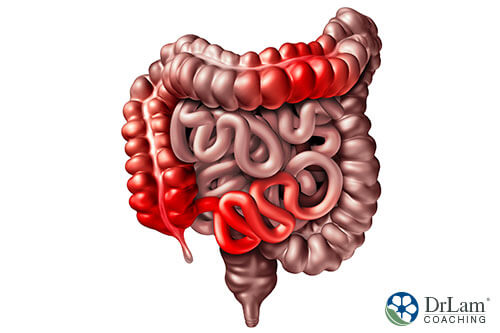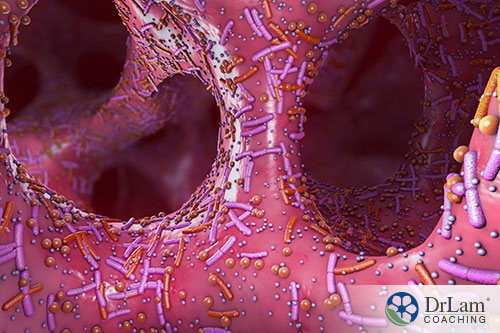 Generally speaking, we tend to see bacteria or yeasts as things that could make us sick. But the truth is that our bodies contain a plethora of different bacterial and yeast strains. And what is more, we need them to maintain optimal health. Taking probiotics for GI conditions involves taking these various beneficial microorganisms as a supplement. These bacterial strains and yeasts help improve your gastrointestinal health.
Generally speaking, we tend to see bacteria or yeasts as things that could make us sick. But the truth is that our bodies contain a plethora of different bacterial and yeast strains. And what is more, we need them to maintain optimal health. Taking probiotics for GI conditions involves taking these various beneficial microorganisms as a supplement. These bacterial strains and yeasts help improve your gastrointestinal health.
Your body’s microbiome consists of both ‘good’ and ‘bad’ bacteria and yeasts. But for the most part, the ‘good’ and the ‘bad’ live in a state of symbiosis and equilibrium. It is only when circumstances arrive that benefit the proliferation of ‘bad’ bacteria and yeasts that a state of dysbiosis results that could lead to gut health issues. When this happens, a course of probiotics for GI conditions may balance things out once more.
When one type of intestinal microbe dies off for whatever reason, the result can be an imbalance in your gut flora composition. This may lead to a number of GI issues. But by taking probiotics for GI conditions, you may help recreate the balance needed for optimal gut health and help improve gut function. These are some of the ways probiotics can help.
Certain microbiota can cause fermentation of certain nutrients that result in the creation of an acidic environment in your colon. This may help rid your GI tract of those bacteria.
Certain probiotics for GI conditions may inhibit the growth of some types of bad bacteria by displacement. They create an environment that promotes the growth of wanted bacteria, thus limiting the growth of unwanted bacteria.
Your GI system plays an important role in immune function and your inflammatory response. Some probiotics for GI conditions can have a moderating influence on certain inflammatory functions.
The epithelial barrier lining your GI wall prevents foreign pathogens from entering your bloodstream. However, inflammation, often associated with chronic health conditions including GI issues and adrenal fatigue, may cause openings in this barrier. This means that not only nutrients needed for your continued health, but also toxins and pathogens, can pass into your bloodstream. This could worsen low-grade, chronic inflammation as well as cause leaky gut syndrome.
Probiotics for GI conditions may improve the function of this epithelial barrier. They may also help activate intestinal epithelial cell receptors. These play a signaling role between your gut microbes and your immune cells and mediate balance by giving off certain chemicals and hormones.
Probiotics for GI conditions may help reverse depression resulting from gut-microbiome issues. Your gut and brain health are linked, especially your cognition and emotions.
Inflammation is part of your body’s immune response and indicates that your immune system is working to fix an issue. Your immune response and inflammation circuit both form part of your body’s NeuroEndoMetabolic (NEM) Stress Response, which jumps into action whenever presented with a threat.
While short-term inflammation and its symptoms shows your body’s healing in action, long-term inflammation has its own set of complications and corresponding symptoms. More so if your GI tract is involved.
There are many things that could go wrong and have a negative effect on your overall gut health. This includes gut dysbiosis and inflammation. Gut dysbiosis can also cause an imbalance in gut flora that, when entering the bloodstream, may cause various brain-health issues. Amongst these issues are anxiety, depression, brain fog, insomnia, and many others.
Here, taking probiotics may help stabilize your gut flora ratios and, in so doing, support brain health as well.
 Many people are quite unaware of the close link between their gut health and adrenal fatigue. Even those who have the condition. This could be because we associated gut health with our gut microbiome and adrenal fatigue with either too high or too low cortisol levels. But a compromised gut increases stress, resulting in increased adrenal fatigue conditions. On the other hand, adrenal fatigue may also deteriorate your gut health.
Many people are quite unaware of the close link between their gut health and adrenal fatigue. Even those who have the condition. This could be because we associated gut health with our gut microbiome and adrenal fatigue with either too high or too low cortisol levels. But a compromised gut increases stress, resulting in increased adrenal fatigue conditions. On the other hand, adrenal fatigue may also deteriorate your gut health.
A study on humans looked at the effect of probiotics on cortisol levels. What astounded researchers was that they saw a reduction in participants’ cortisol levels when taking probiotics.
But addressing other gut issues may also have a positive effect on adrenal health. The inflammation associated with leaky gut syndrome, for example, may put more pressure on your adrenals to perform. On the flip side, by addressing gut inflammation you lower the stress your adrenals experience, thereby giving them support in their healing process.
Because of this, intestinal and adrenal support should ideally take place at the same time. An improvement in the health of the one has a positive effect on the health of the other.
Many factors support gut health. Likewise, many factors could lead to gut dysbiosis. Most frequently, though, gut flora imbalances result from:
Gut dysbiosis symptoms vary in both the type of bacterial imbalance that develops as well as where it develops.
Examples of the most common symptoms include:
Many in the medical field these days advise people to use probiotics alongside medications when addressing certain health issues. But different probiotics can be of more benefit in addressing certain specific issues. It is not a case of one size fits all. This is because each probiotic strain has its own effective gastrointestinal benefit.
What follows is a simple guide to choosing which probiotics may help different GI conditions in adults and how they work.
Acute amoebiasis, or amoebic dysentery, usually occurs in tropical areas. Infection comes from eating uncooked food or drinking untreated contaminated water. The infection is caused by the amoebae of the Entamoeba group, and symptoms including cramping, diarrhea, fever, bloody stools, and possibly liver abscesses.
The Saccharomyces boulardii probiotic is family to brewers’ yeast and may help reduce the various symptoms of an infection like diarrhea, fever, and abdominal pain. It may also help address amoebic cyst formation. Dosage is typically three times per day for a period of up to four weeks.
 Acute diarrhea is the abrupt onset of diarrhea with at least three stools a day. It may result from food intolerance, an allergic reaction, or bacterial or viral infection.
Acute diarrhea is the abrupt onset of diarrhea with at least three stools a day. It may result from food intolerance, an allergic reaction, or bacterial or viral infection.
The Bacillus coagulans probiotic may help with abdominal pain, stool frequency, and stool consistency. Dosage is typically twice daily for up to ten days. Similarly, the Saccharomyces boulardii probiotic may help in more severe cases and help reduce the duration of the infection or your risk of hospitalization.
A case of acute gastroenteritis may see you vomiting or having diarrhea, or both, for more than a week. Other symptoms include fever and abdominal pain. The most common causes include either a viral or bacterial infection.
In older people, a four-times-per day dosage of Lactobacillus casei strain Shirota for a month may help reduce the duration of the accompanying fever. It may also increase your GI tract’s beneficial gut bacteria composition.
Antibiotics can disturb the natural balance of your gut flora. If it has a negative effect on your ‘good’ bacteria, ‘bad’ bacterial strains may flourish and cause gut dysbiosis and its different symptoms.
Good single-strain probiotics for GI conditions include:
Similarly, multistrain probiotics may also be of benefit. Good choices include:
C. difficile is a contagious bacterial infection with symptoms that include fever, diarrhea, stomach pain, and even inflammation of the colon that could have serious consequences.
Single strain probiotics for GI conditions that may help with this issue include:
Multistrain probiotics for GI conditions that target C. difficile include:
 Various cancer therapies may cause GI health issues. Chemotherapy, for example, may damage the healthy cells lining your gut or interfere with your gut bacteria composition. You may experience such issues as diarrhea, constipation, vomiting, and even mouth sores.
Various cancer therapies may cause GI health issues. Chemotherapy, for example, may damage the healthy cells lining your gut or interfere with your gut bacteria composition. You may experience such issues as diarrhea, constipation, vomiting, and even mouth sores.
In adults, single-strain probiotics for GI conditions relating to cancer therapy include:
Multistrain probiotic options to consider include:
Celiac disease, an autoimmune disorder resulting from an immune reaction to gluten, has symptoms that include inflammation of the intestinal lining, diarrhea, bloating, gassiness, fatigue, anemia, and osteoporosis. A significant number of people with this disorder show no symptoms, however.
Probiotics for GI conditions relating to celiac disease include:
Chronic constipation in adults may have many causes, including:
Single strain probiotics for GI conditions relating to chronic constipation include:
Multistrain probiotic compounds that may help with chronic constipation include:
Numerous issues may contribute to chronic diarrhea, including irritable bowel syndrome, inflammatory bowel disease, chronic infections, and food malabsorption.
Single strain probiotics for GI conditions relating to chronic diarrhea include:
Multistrain probiotics for chronic diarrhea include:
Collagenous colitis is an inflammatory bowel disorder affecting the colon. Although occurring more often in middle-aged adults, more women are affected than men.
An Escherichia coli Nissle probiotic taken for up to 18 weeks may reduce stool frequency while improving its consistency.
 An inflammatory bowel disorder, Chron’s disease causes inflammation of your digestive tract. This, in turn, may result in fatigue, diarrhea, pain in the abdominal area, and weight loss.
An inflammatory bowel disorder, Chron’s disease causes inflammation of your digestive tract. This, in turn, may result in fatigue, diarrhea, pain in the abdominal area, and weight loss.
A seven-day course of Lactococcus lactis probiotic may reduce the condition’s activity.
A multistrain probiotic containing B. breve, B. infantis, B. longum, L. acidophilus, L. delbrueckii subsp. bulgaricus, L. paracasei, L. plantarum, and S. thermophilus for up to 9 months may also help reduce inflammation in the affected area.
This condition involves the development of small pockets in the digestive tract that become inflamed. Symptoms include fever, pain, nausea, and bowel movement changes.
A Lactobacillus casei probiotic taken ten days per month for up to two years may help prevent a recurrence.
Functional GI symptoms refer to GI symptoms arising from issues in your mid and lower GI tract. These include stomach pain, bloating, nausea, and bowel movement discrepancies. The most common functional bowel disorders include constipation, dyspepsia, and irritable bowel syndrome (IBS).
Probiotics for GI conditions arising from this area of your GI tract include single strain probiotics such as:
Supporting your GI health is always a good idea. The aging process may have a negative effect on GI flora composition, and other factors like stress may also degrade your microbiome.
Probiotics to support general intestinal health include:
Multistrain probiotics to consider include:
Giardiasis, a gastric disorder, results from infection by Giardia, a microscopic parasite. Taking the probiotic Saccharomyces for ten days may reduce the presence of the parasite.
 Many people have this type of bacteria in their stomach without even knowing it. In a few, however, symptoms may arise that include ulcers and possibly stomach cancer.
Many people have this type of bacteria in their stomach without even knowing it. In a few, however, symptoms may arise that include ulcers and possibly stomach cancer.
Probiotics for GI conditions that fight H. pylori bacteria include:
Multistrain probiotics for H. Pylori include:
IBD is an umbrella term describing several GI disorders dealing with inflammation of the GI tract.
Probiotics for GI conditions dealing with IBD include:
Intestinal permeability refers to the ease with which substances can pass through your intestinal wall and into your bloodstream. The more permeable this lining, the easier it becomes for toxins and other substances to pass through.
The following probiotics may improve intestinal permeability and promote gut repair:
IBS is a large intestine disorder that includes symptoms such as diarrhea and/or constipation, bloating, gas, abdominal pain, and cramps. Both single strain and multistrain probiotics may provide relief.
Single strain probiotics for IBS include:
Multistrain probiotics for IBS include:
 SIBO refers to a condition whereby bacteria usually found in other parts of the gut start growing in the small intestine. Symptoms commonly associated with this include diarrhea, bloating, gas, abdominal pain, and constipation.
SIBO refers to a condition whereby bacteria usually found in other parts of the gut start growing in the small intestine. Symptoms commonly associated with this include diarrhea, bloating, gas, abdominal pain, and constipation.
Lactobacillus casei may help address abdominal pain, flatulence, and nausea associated with SIBO.
Stress can have a negative impact on gastric health. For example, common stress-related GI issues may include pain in the lower abdominal region, nausea, vomiting, constipation, heartburn, and indigestion.
A Bifidobacterium bifidum probiotic taken three times daily for six weeks may help reduce diarrhea.
Also, a multistrain probiotic containing B. longum Rosell and L. acidophilus Rosell three times daily for three weeks may help reduce abdominal pain as well as nausea and vomiting.
An IBD associated with long-term inflammation and ulcer formation, ulcerative colitis commonly affects your colon and rectum lining.
The various probiotics addressing ulcerative colitis tend to focus on reducing the condition’s activity, relapse rates, inflammation, and the various symptoms that include those associated with IBD.
Probiotics that help address the issues associated with ulcerative colitis include:
When selecting a probiotic supplement, look for one holding only a few strains with a low dose. Ideally, the dosage should be less than 10 billion CFU. While sometimes large doses may be helpful, those with health conditions including adrenal fatigue should note that more is not necessarily better. Each person is very different and what works for one person may cause problems for another. Having fewer bacterial strains also means that the probiotic is less likely to confuse your body while the present strains get the chance to work the way they should.
A good example is Pro-B from Dr. Lam. This propriety blend has a dosage of 8 billion CFU, putting it well within the maximum dosage recommendation. It also contains three bacterial strains: Lactobacillus acidophilus, Bifidobacterium lactis, and Bifidobacterium longum.
Together, these ‘good’ bacteria help improve proper digestion and food absorption in your gut while helping to maintain flora balance in the intestines.
Another possibility is Adrebiotics, a supplement containing a blend of ten different probiotic bacterial strains. While all of these different bacterial strains promote digestive health and a balanced gastrointestinal microbiome, their formulation has further health benefits that may help address diverse health issues, such as those mentioned, while supplying both immune and adrenal support.
If you are suffering from GI-related issues, here are some things you can do.
 Increase your intake of probiotic-rich foods such as unsweetened, natural yogurt, or fermented foods like sauerkraut or kimchee.
Increase your intake of probiotic-rich foods such as unsweetened, natural yogurt, or fermented foods like sauerkraut or kimchee.Although generally considered safe to use and with side effects a rare occurrence, do make sure you choose the right probiotics for your condition. This means talking to a healthcare professional who can best advise you on which probiotics to consider.
If you would like to know more about or need assistance with choosing probiotics for GI conditions, the team at Dr. Lam Coaching can help. We offer a free** no-obligations phone consultation at +1-626-571-1234 where we will privately discuss your symptoms and various options. You can also send us a question through our Ask The Doctor system by clicking here.
© Copyright 2020 Michael Lam, M.D. All Rights Reserved.
Probiotics for GI conditions may help with adrenal fatigue. This is because they provide adrenal support by helping address GI issues like IBS and gut dysbiosis that put extra stress on overworked adrenals. By taking these probiotics, you indirectly promote your adrenal health.
